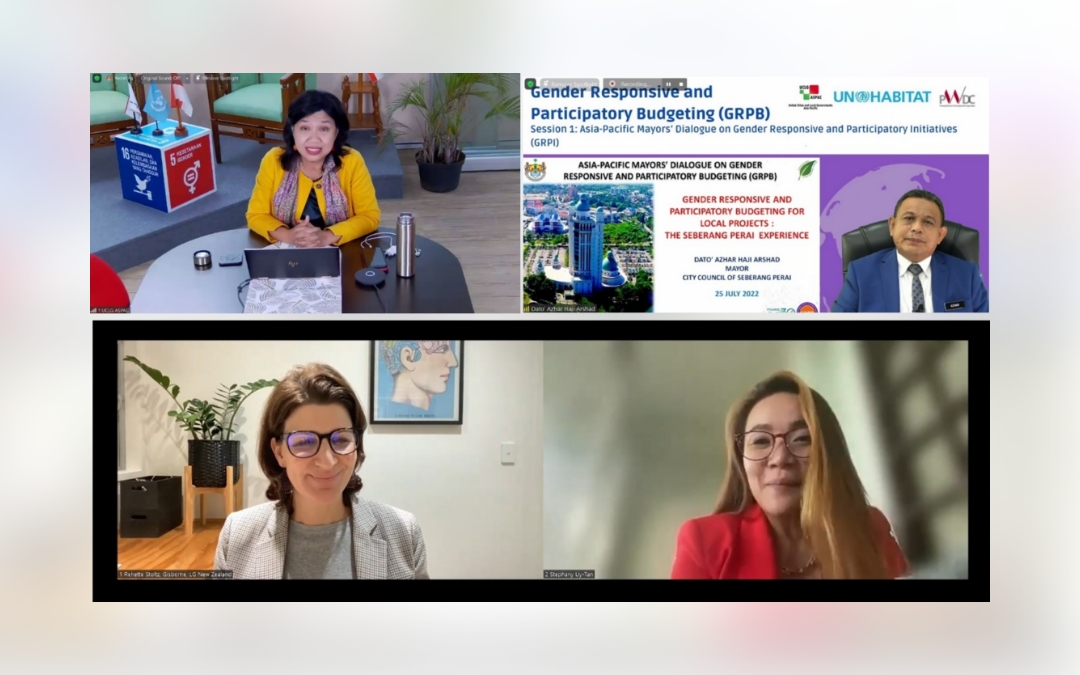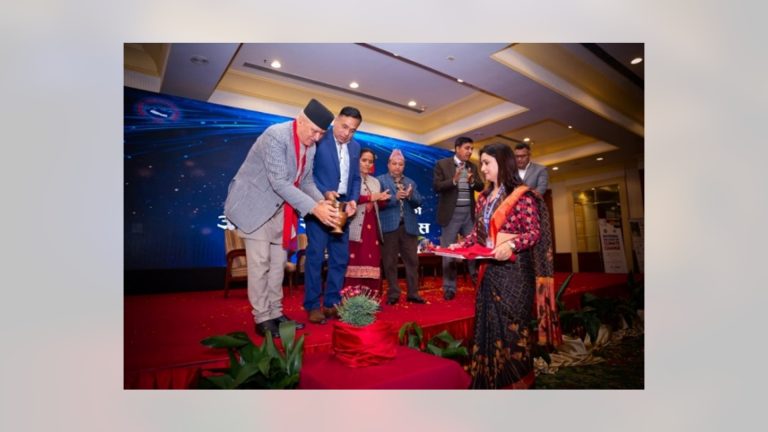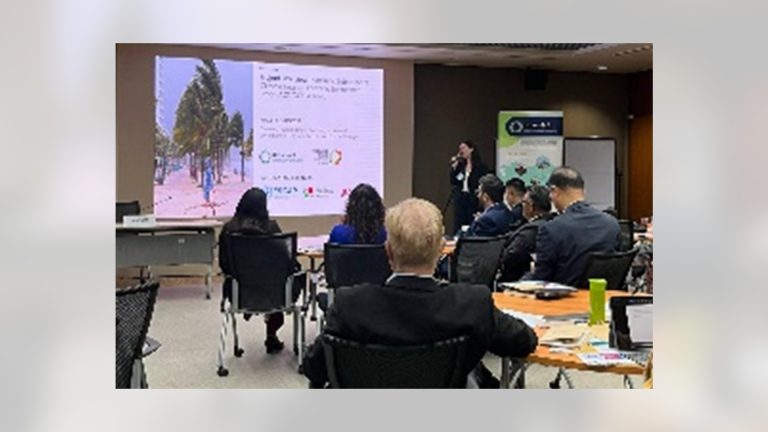25 July 2022 | UCLG ASPAC, within its Standing Committee on Women in Local Governments (SCWILG) and in collaboration with the Penang Women’s Development Corporation (PWDC) and the United Nations Human Settlements Programme (UN-HABITAT), organised the Asia-Pacific Mayors’ Dialogue on Gender Responsive and Participatory Initiatives (GRPI). It was the first of a series of capacity-building activities conducted under the framework of the Gender Responsive Participatory Budgeting (GRPB) programme.
GRPB is one of the initiatives contributing to gender mainstreaming by focusing on the gender dimensions of government budgets, both the revenue and the expenditure side, and it is also one of the accelerators in achieving the Sustainable Development Goals (SDGs) 2030 by leaving no one behind. The GRPI aimed at sharing knowledge of best practices and tools for incorporating inclusiveness, particularly ensuring women’s participation in decision-making processes in developing local policies, and planning and budgeting of projects or schemes undertaken by the cities and local governments in the Asia-Pacific region.
This event attracted a total of 115 registered participants, comprising elected representatives and officials from cities and local governments and their associations, researchers and many other relevant organisations working with the communities in the Asia-Pacific region. Leaders of local government and technical persons were invited as panelists to present their initiatives and best practices of women’s participation in development processes.
In the opening session, Dr. Bernadia Irawati Tjandradewi, UCLG ASPAC Secretary General who is also a member of the Advisory Group on Gender Issues (AGGI) of UN-Habitat, stated that GRPB strategies respond to the lack of gender neutrality of budgets with analysis of the gender impacts of government spending and revenue raising. It could be used as an approach/method to promote actions to change policies and budget priorities in line with women’s empowerment and gender equality. Moreover, GRPB could be a good sign for good governance implementation in cities and local governments. With GRPB, she added that governments would provide good services and promote equitable growth and development as well as their commitment to gender equality and participation.
Ms. Angela Mwai, Chief of Human Rights and Social Inclusion Unit of UN-Habitat, read out the message of Ms. Maimunah Mohd Sharif, Executive Director of UN Habitat, that Mayors are champions for good governance, and bringing attention to women’s equality and empowerment in the region. Women’s equality and gender advancement are being challenged by conflicts, global pandemics and climate disasters, and to address complexities, tools and policies must not only be developed but internalised because they are taken into account gender-specific implications. At the same time, budget legal resources and frameworks must move closer together with gender equality to transform the discriminatory structures. GRPB is crucial to be prioritised as a strategy to end gender inequality to secure the engagement of the unduly marginalised group, which is women and girls and to ensure the sustainability of result-driven actions.
Ms. Ong Bee Leng, CEO of PWDC, shared the journey of GRPB in Penang, Malaysia; a practical GRPB implementation at the local level. Essentially, GRPB’s key idea is to make the policies and budget inclusive to achieve gender equality and social justice. GRPB is the combination of two concepts: first is “Gender Responsive”: how the budget is according to the needs of the community served and this is used by the policymakers and government agencies for planning and allocation of budget to narrow down the gender inequality; and second is “Participatory Budget” that is creating a platform where people can participate in the whole process of planning and implementation by giving space to the community voice.
Mr. Tam Hoang, Sustainable Urbanisation Specialist of UN-Habitat moderated the panelists comprising Mr. Roberto and Ms. Angela from UN-Habitat. Mr. Roberto shared how GRPB offered innovative policy framework, leadership and action and built capacity and knowledge and digital infrastructure to support innovative model of governance to the world. He presented the key SDGs targets and indicators relevant to GRPB. He also emphasised the importance of scaling up GRPB through learning and adopting the work of other cities and local governments. Ms. Angela from UN-Habitat presented “Her City Toolbox for Participatory Public Space Planning and Design” which was launched on International Women’s Day by UN-Habitat in 2021. The tool helps girls to participate in the planning that is co-creation of cities from girls’ perspective.
Mayors’ Dialogue on SDG5 Session was moderated Ms. Stephany Uy Tan, Co-Chair of UCLG ASPAC Standing Committee on Women in Local Governments. In this session, mayors and local governments introduced their best experiences in implementing GRPB for gender inclusiveness in policies/projects undertaken by their city and local government. Sharing panelists included Dato’ Azhar Bin Haji Arshad, Mayor of Seberang Perai City Council, Penang, Malaysia, – Ms. Lim Phallika, Deputy Governor of Siem Reap Municipality, Cambodia, – Ms. Anushiya Jayakanth, Councillor Velanai Pradeshiya Sabaha, Chairperson of Women Councillors Network, Jaffna District Sri Lanka, –Ms. You Yimin, Deputy Secretary General of Guangzhou People’s Association for Friendship with Foreign Countries, Guangzhou City, China, – Ms. Rehette Stoltz, Mayor of Gisborne District Council, New Zealand, – Ms. Sunita Dangol, Deputy Mayor of Kathmandu, Nepal and –Dr. Hendrar Prihadi, Mayor of Semarang City, Indonesia.
Concluding the online event, Dr. Bernadia Irawati Tjandradewi shared that the event was a good opportunity to learn a lot from speakers who are carrying out city management, city planning and allocation of budgets from a gender perspective by giving access to women in communities, capacity building, engaging women in planning and ensure their participation in implementation etc., and how digital technology can play a great role in getting more participation of women in planning and city management. As part of this capacity-building programme, a learning workshop for GRPB for practitioners will be organised for Malaysian cities and local governments as well as other local governments in the region later this year.











